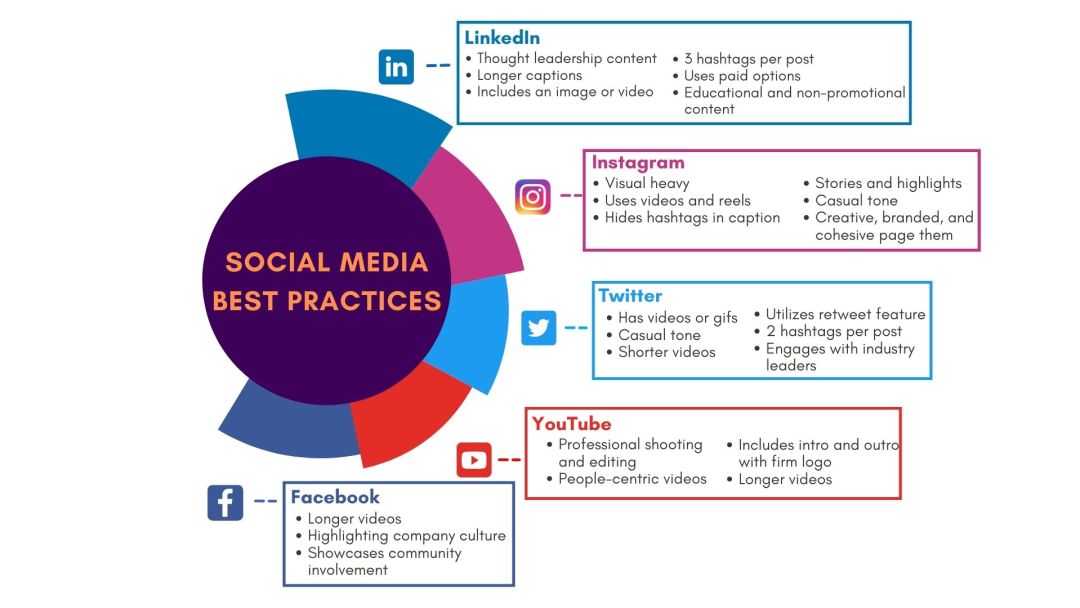The essential guide to marketing for law firms

Table of contents
Legal services may not be one of many industries to consider when considering disruptive online marketing. Still, that doesn’t mean they don’t need to leverage digital marketing just as much as any other B2B or B2C company.
77% of legal firms agree that social media platforms are the best way to market themselves, and 58% think social media is critical for client development. Yet, ironically, social media is their most underperforming marketing channel.
The power of word of mouth is indeed moving online. Maintaining your reputation as a trusted legal services online provider requires a dynamic digital strategy considering target audiences, client nurturing, and the right level of thought leadership and creativity.
Why law firms need a marketing strategy

Increasingly, the search for legal advice and representation starts online. Law firms need a strategy to draw the right clients’ attention and make a positive first impression. With the proper marketing, you can increase brand awareness, ultimately standing out from the competition and improving your client acquisition rates and revenue growth.
Marketing isn’t just for building new relationships – it’s also for maintaining and strengthening existing ones. Customer relationships are crucial in the legal industry because corporations always need legal support. If one company is happy with your service and support, they will likely turn to you whenever they face a legal challenge.
However, you must also ensure that you continue to engage with them and provide value through social media management. You can keep your customers updated with company and industry news, positioning your firm as a thought leader and subject matter expert. You can also share positive reviews and promote referrals to friends and colleagues.
Lastly, an online marketing strategy is crucial if you are looking to expand into new demographics, market subsectors, or geographics. For example, you can use social media data analytics to target the right audience and verify what content resonates with them before you put your dollars and resources to work.
How should you approach marketing for law firms?
Most online marketing guides assume that e-commerce shoppers or B2B software buyers are the target customers. Law firm clients are a narrower audience with different motivations and decision-making criteria. You must also ensure your marketing efforts comply with regulations and standards like the American Bar Association’s Marketing and Advertising Guidelines.
One of the first steps is to develop detailed customer personas based on the people most likely to need your services. Consider why those individuals might want to choose your firm over a competitor’s. These are the models for your target audience, the readers, and viewers you consider as you develop your marketing content.
Another factor to consider is that many leads begin searching for a lawyer on social media and prefer to stay on their preferred platform. With so much potential for outreach and missteps, you must treat social media as a pillar of your digital marketing strategy.
Nearly six out of ten clients seek personal referrals when hiring an attorney, so one of the most valuable assets a law firm can have is a good reputation. For this reason, you’ll want to create
helpful content highlighting your firm’s unique selling points and target audience segments that are a good fit and likely to be retained as satisfied clients.

Marketing for law firms: strategies to consider
1. Website optimization
Your firm’s website will be one of the first destinations for prospective clients and your best way to make a solid initial impression. It should convey competence and professionalism while being accessible, easy to navigate, and mobile-friendly. Evaluate the visual appeal of your branding and consider whether it needs to be updated.
Though crucial to keep your brand fresh and timely, website optimization projects may be lengthy, costly, and resource-consuming. Plus, if your marketing team isn’t necessarily specialized in web development, they will throw many shots in the dark before landing on the right visuals, structure, SEO copy, and UX capabilities. It may be easier to employ a B2B marketing agency that has experience building websites for legal services to reduce your margins for error.
2. Organic social media and partner advocacy
Social media is an integral part of any digital marketing strategy. It offers broad reach and the ability to target specific audience segments, providing firms with tremendous potential to build brand awareness, promote their content, and connect directly with potential clients.
Employee advocacy programs, which involve the attorneys in your firm in posting content to social media and engaging in conversations, leverage social media’s immediacy and authenticity to build trust with your audience.
Your attorneys are your ultimate thought leaders, so why not let your audience hear directly from them? Tools like Oktopost make it easier to invest in employee advocacy, helping employees discover, filter, recommend, and share company posts with pre-approved messaging.
Maintaining a consistent social media presence that provides high-quality content and thoughtful interactions with users can drive organic traffic to your website and blog, saving you money on PPC campaigns and generating higher-quality leads.

3. Landing pages for lead generation
As important as your main website, creating lead-gen landing pages for your marketing campaigns is also a good idea. These allow you to track the results of your efforts and use targeted offers to capture leads that have already expressed interest in your firm by following a link on your external marketing content.
You can have one landing page per customer segment or use case, helping you target your content to a specific audience and get high-quality leads. Great landing pages will have an offer tied to a clear value proposition, a concise lead capture form, and a persuasive call to action.
4. Email marketing
This low-cost channel can still deliver strong results, and with software automation tools, it’s easy to measure, analyze, and test its performance. If you are a Salesforce user, look into your Salesforce environment to check all the email automation support tools you can leverage. Similarly, HubSpot offers various features to automate email sends based on predefined audiences or triggers. By providing informative, value-added content like an email newsletter, you can build a loyal reader base and establish yourself as a voice of authority in your legal niche.
5. Local SEO
Many law firms operate within specific geographical areas, making local SEO a crucial strategy for attracting relevant clients. Targeting locally relevant keywords can lower your PPC costs while increasing your reach and visibility among the most likely convert audiences. Local SEO strategies include optimizing Google My Business listings, acquiring local backlinks, and generating positive reviews from clients in the area.
6. Thought leadership
If you can produce knowledgeable, insightful content regularly, you can join the ranks of thought leaders in your field, enhancing your brand recognition and reputation. Blog posts, whitepapers, videos, ebooks, and webinars can all be utilized in a content strategy to provide thought leadership. Your choice of platform also makes a difference—LinkedIn is an excellent place to post long-form written content, but on Facebook, you may find that video gets more engagement.

7. Testimonials and case studies
Clients want assurance that your firm can handle their cases and deliver a good outcome. Social proof, such as case studies and testimonials from previous clients, can provide credible assurance of your trustworthiness and expertise. Ensure you get impactful quotes that you can use to elevate other marketing materials.
Plus, if you can get them to do this case study in video format, you can leverage this video for future campaigns or social posts. To maximize the video’s effectiveness, consider hiring a professional videographer and using high-quality equipment to ensure a polished and professional result.
3 examples of successful marketing from law firms
1. Miracle Mile Law Group
The employment attorneys at this California law firm lead with a strategy emphasizing informative blog posts and client testimonials. Miracle Mile’s clients are individuals dealing with issues like wrongful termination and other workplace law violations who benefit significantly from content that helps them better understand their rights and legal options. The blog content—often inspired by questions from real clients—builds trust and authority, and the positive testimonials provide objective evidence that Miracle Mile can deliver in court and on the page.

2. Hodge, Jones & Allen
This UK-based firm offers various services, including criminal defense, family law, and environmental justice. Hodge, Jones & Allen focus on partner advocacy to foster connections with diverse online audiences who might need their representation. Their partners and employees post company news, explainer videos, legal insights, and success stories on Facebook, LinkedIn, YouTube, and X. The tone tends to be informal and approachable, humanizing the firm’s brand and building authentic rapport with prospective clients.

Another UK law firm, Irwin Mitchel, provides personal, financial, and business law services. They’ve built a trustworthy and authoritative reputation on a content strategy that features free, weekly webinars. These webinars run 30 to 60 minutes each and can be viewed live or prerecorded. Live viewers also get the opportunity to participate in Q&A sessions. All the viewer needs to do to access this high-value content is enter some contact information into a form—a good deal for them and a successful lead capture for Irwin Mitchell.

Closing arguments
Law firms may operate differently than retailers or B2B providers, but they’re under similar pressures to establish a strong brand image, expand their customer base, and keep revenues growing. A digital marketing strategy tailored to the needs of the legal services sector is an investment that can yield significant returns in all of these interconnected goals.
Many of the most effective marketing initiatives are much easier to pull off when you have the right software solutions supporting you. Social media management tools like Oktopost can streamline your marketing efforts, amplify your messaging beyond the usual channels, “listen” for relevant online conversations, and provide you with specialized features for launching and running employee advocacy campaigns.
Sign up for a free demo today to see how Oktopost can elevate your law firm’s digital marketing strategy.




